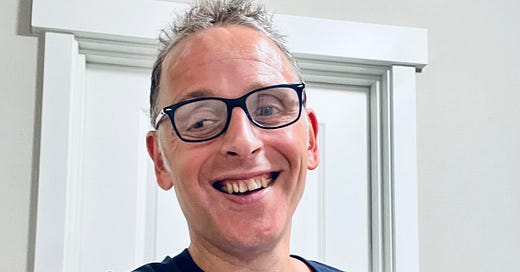What Makes for a "Successful" Day?
Putting Aside the Pressure to Perform, in Order to: Simply Be Excellent to Each Another
Hello Beautiful Beings!
What is the mark of a successful day? Culturally and collectively, it seems to me, productivity is what we value most. We champion money made, tasks accomplished, products created, customers served, and so on. When we greet someone toward the end of the day, we name this by making, “What did you do today?”, a central question we ask one another.
Now don’t get me wrong, productivity is important. It built our house, constructed our car, grew and harvested our food, and so on. The problem is, we place it over and above the deeper, more vital thing: Love—which leads to connection, care, compassion, celebration, and communion. By naming productivity as the hallmark of success, we make it the measure of a person’s worth. Can you feel the weight of that?
As a disabled person, who is significantly slower at most every task, I’ve long found this to be deeply shaming, ostracizing, and troubling. For years, every time someone asked me, “What did you do today?”, I shriveled up inside, because I knew my doings did not meet society’s standards. Given 13+% of people in the U.S. have some type of disability, nearly 20% experience a mental illness, and then factor in diabetes, cancer, and beyond; it seems to me our collective story about what makes for “success”, hurts and harms a significant number of people.
I believe know we can do better.
Always put people first.
In May, I graduated with a Doctorate in Leadership and Spiritual Formation. I mention that because, over and over and over again, we learned that great leaders always put people first. Even though the “task” was productivity, they viewed the people as first and foremost. And by doing so, more often than not, greater productivity followed than if, and when, it was put first! In life, when we put the first things first, the rest naturally follows and flows.
Now, it’s important to point out that the cousins of the productivity first mindset, are: Comparison and Competition. As a yoga teacher, for years I felt compelled to measure how well I did, by noting how many students I had in classes, compared to other teachers. Likewise, as a writer, I lived and died by the number of people who read my blogs. Fortunately, by the time I published my first book, Falling into Love: The Transformative Power of Community, I’d “largely” left this mentality behind. As humans, aren’t we always masterpieces in progress?
We came from love. We are here to love. We will return to love.
(Me, in one of my favorite shirts)
A primary problem with following capitalism and consumerism’s call to productivity, comparison, and competition, is that it fills us with a sense of scarcity, a feeling of lack, and a never-ending yearning for more. What is more, it turns life into a game that you can never win, because there will inevitably be someone who outdoes you. Or, as Lily Tomlin noted, “The trouble with the rat race is that even if you win, you’re still a rat.”
I know that when I lived this way, I felt dirty, small, grimy, and less-than on the inside.
Can you guess what washed the shame of living from a productivity-first, compare, and compete mindset off of me? Love. This giving of oneself for individual and communal flourishing, because we remember each and every one of us is innately more precious than all the diamonds in the world, has—time and again—healed, transformed, and nourished me in ways too beautiful to describe.
Be excellent to each another.
One of my favorite shirts champions this classic line from Bill & Ted’s Excellent Adventure. Now, when we pause, think about it, and get super honest: Isn’t life really that simple? All we really need to do is: Be excellent to each other. Isn’t that a summary of what the people who move and inspire us did and taught?
When we do that together. When we realize there’s more than enough to go around. When we focus on loving, caring for, and lifting one another up. We thrive and shine together, and, all the productivity we need happens as a helpful byproduct, instead of as a burdensome focal point.
What’s your experience been like? What are your thoughts on the matter? When we shift our emphasis from productivity to connectivity, from what we accomplish to who we connect with and care for, have you noticed the same increase in inner and outer excellence I have?
May we be excellent to each other today!
Hugs & Love,
Lang (aka “Dr. Love”)
P.S. I recently added well more than $75 in exclusive benefits for anyone who signs up for the paid subscription. Check it out!




